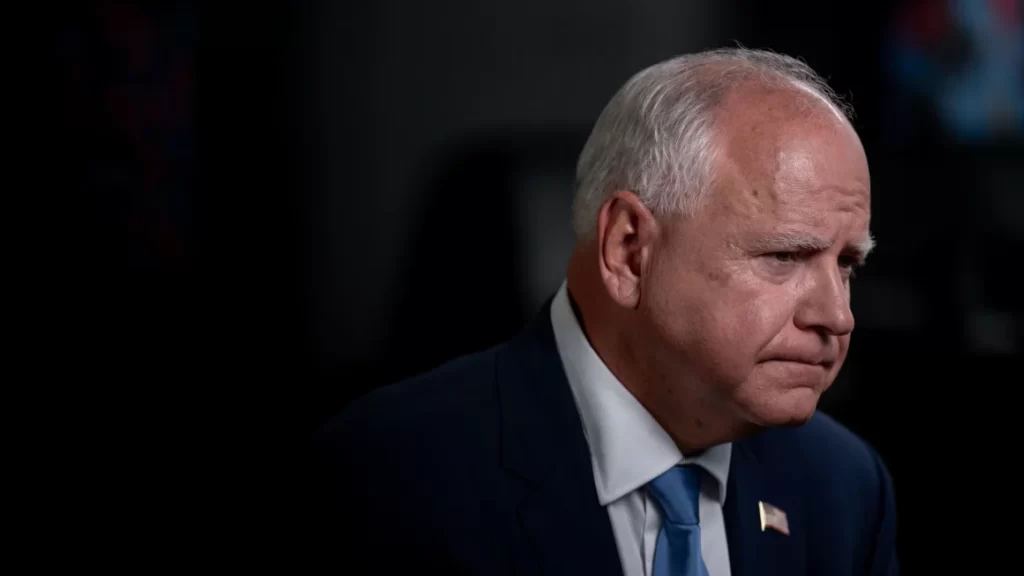Walz Admits Misstatement About 1989 Hong Kong Trip Amid Controversy Over Tiananmen Square Claims
3 min read
Minnesota Gov. Tim Walz is interviewed by CNN’s Dana Bash in Savannah, Georgia, on August 29, 2024.

Minnesota Gov. Tim Walz is interviewed by CNN’s Dana Bash in Savannah, Georgia, on August 29, 2024.
Minnesota Governor Tim Walz recently acknowledged that he “misspoke” regarding his whereabouts during the Tiananmen Square protests in 1989. During a vice presidential debate, he asserted that he was in Hong Kong during the pro-democracy demonstrations but faced scrutiny after reports emerged contradicting his claims about that time.
Walz’s comments surfaced amid renewed media attention on his past statements about traveling to China. Specifically, he had previously claimed he was in Hong Kong preparing for a teaching role during the protests that ultimately resulted in numerous deaths at the hands of the Chinese government.
“My community knows who I am. They saw where I was at,” Walz said during the debate, expressing pride in his service and connection to his constituents. “I will be the first to tell you, I have poured my heart into my community. I’ve tried to do the best I can, but I’ve not been perfect.”
When pressed by CBS News moderators about the discrepancies between his past comments and recent media reports, Walz admitted, “I misspoke.” He added, “All I said on this was, I got there that summer, and I misspoke on this.” However, he maintained that he was indeed in Hong Kong and China during the protests and suggested that this experience influenced his understanding of governance.
Throughout his career, Walz has organized trips to China, particularly during his tenure as a teacher before entering politics. He previously stated he visited Hong Kong in May 1989, just weeks before the tragic events at Tiananmen Square. In a 2014 congressional hearing, he recounted specific memories from that period, indicating that he was preparing to teach high school in China.
In a 2019 radio interview, Walz further claimed he was in Hong Kong on June 4, 1989—the day of the Tiananmen Square massacre. “It was very strange ‘cause, of course, all outside transmissions were blocked,” he recalled, noting that he remained unaware of significant global events during his stay.
His assertions about being in Hong Kong during the protests were reinforced during a 2009 hearing commemorating the Tiananmen Square protests, where he discussed his preparations to teach in Foshan, China. However, recent investigations by outlets such as the Washington Free Beacon have challenged these claims, revealing that contemporaneous newspaper reports indicated Walz was in Nebraska around that time.
For instance, a May 16, 1989, issue of the Alliance Times-Herald included a photo of Walz in Nebraska, indicating he was preparing to take a job in Alliance. Another report from April of that year stated he planned to travel to China in early August.
When asked for clarification on these discrepancies, the Harris campaign, which Walz is part of, could not provide evidence to substantiate his claims of being in Hong Kong during the protests. A source close to Walz mentioned that he aimed to convey that while some participants in the World Teach program considered withdrawing after the events, he felt it was crucial to continue promoting American democracy and history in China.
Additionally, Walz appears to have overstated his travel frequency to China. In a 2016 interview, he claimed to have visited the country “about 30 times,” but a spokesperson later suggested that the number was likely closer to 15.
Walz’s ties to China have come under increasing scrutiny from Republican opponents. Jason Miller, a senior advisor to Donald Trump’s campaign, expressed anticipation for attacks on Walz’s history during the debate. Congressional Republicans have also called into question his connections to China, with House Oversight Chairman James Comer subpoenaing documents related to Walz amid allegations of ties to the Chinese Communist Party.
These inconsistencies are not isolated. Since becoming the Democratic vice presidential nominee, Walz has faced scrutiny for previous statements, including a 2018 claim about handling assault weapons “in war,” which his campaign later clarified was a misstatement.
As Walz navigates this controversy, the focus on his history of travel and statements about China could have significant implications for his campaign.